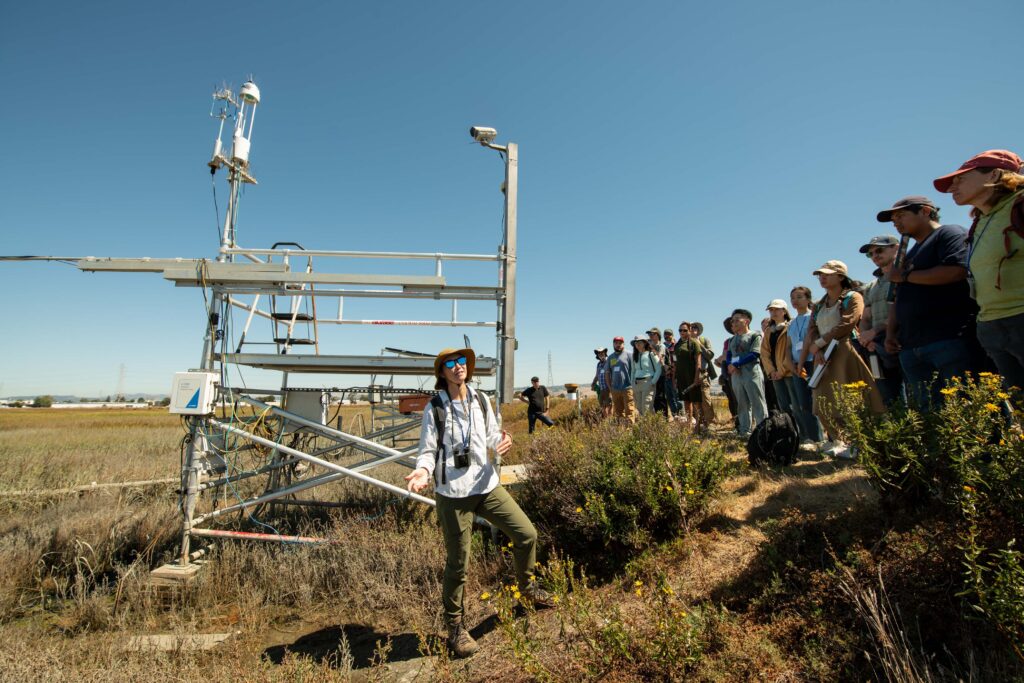AmeriFlux Meetings and Workshops

Participants in the AmeriFlux 2024 Annual Meeting tour the Eden Landing Reserve in Union City, California, and listen to a description of the restored wetland and the flux tower on the site, 09/06/2024.
With DOE, we co-sponsor the AmeriFlux Annual Meeting, where all members of the AmeriFlux community are welcome. We also organize annual AmeriFlux Data and Tech Workshops, where attendees can get practical advice and hands-on training. As the community requests, we hold workshops on special topics.
jump to: Meeting Archive
2025 AmeriFlux Annual Meeting
October 22-24: Annual Meeting (hybrid plenary sessions, in-person or virtual breakout discussions and in-person poster session)
- hybrid plenary sessions
- breakout sessions completely in-person or completely virtual
- in-person location in Tuscon, Arizona
- Submit abstracts here by August 1st, find suggested topics below
- Travel stipend application here – please apply by July 18
- Meeting website here, with more info coming soon
Archive of past meetings and workshops
- 2024 AmeriFlux Annual Meeting, September 3-6, Berkeley and online
- 2024 Regional Workshop Las Cruces, August 20-21, Las Cruces, NM
- 2024 Regional Workshop Kearnseyville, June 27, Kearneysville, WV
- 2024 Workshop: Remote Sensing and Fluxes Upscaling for Real-world Impact, July 9-10, Berkeley, CA and online
- 2023 AmeriFlux Annual Meeting, October 4-6, Harvard Forest and online
- 2023 Regional Workshop Madison, August 15-16, Madison, WI
- 2023 Linking Optical and Energy Fluxes Workshop (main funder FLUXNET Coop), July 12-15, Boulder, CO and online
- 2023 Data-Tech workshop, May 10-11, hybrid at Berkeley Lab and online
- 2022 AmeriFlux Annual Meeting, September 7-9, hybrid at UMBS and online
- 2021 Evapotranspiration Workshop, November 2-4, virtual
- 2021 AmeriFlux Annual Meeting, September 20-22, virtual
- 2021 Land-Atmosphere Interactions Workshop, June 10-11, virtual
- 2020 AmeriFlux Annual Meeting, October 6-8, 2020, virtual
- 2019 AmeriFlux Annual Meeting, September 17-19, 2019, Boulder CO
- 2019 AmeriFlux Data-Tech Workshop, October 28-30, 2019, Berkeley CA
- 2018 AmeriFlux Decadal Synthesis Workshop – August 23-24, 2018, Berkeley CA
- 2018 AmeriFlux PI Meeting – October 24-25, 2018, Bloomington IN
- 2018 AmeriFlux Data and Tech Workshop – October 22-23, 2018, Bloomington IN
- 2017 Joint NACP-AmeriFlux All-Investigators Meeting – March 27-30, 2017, North Bethesda MD. See meeting page hosted by NACP
- 2016 AmeriFlux PI Meeting and Data-Tech Workshop
- 2015 NACP/AmeriFlux Annual PI Meeting – January 29-30, Washington DC—This archive is being revised.
- 2015 AmeriFlux Data and Tech Workshop – March 18-20, 2015, Berkeley CA
- 2014 AmeriFlux Annual PI Meeting – May 4-5, Bolger Center MD
- 2014 AmeriFlux Data Managers Workshop
